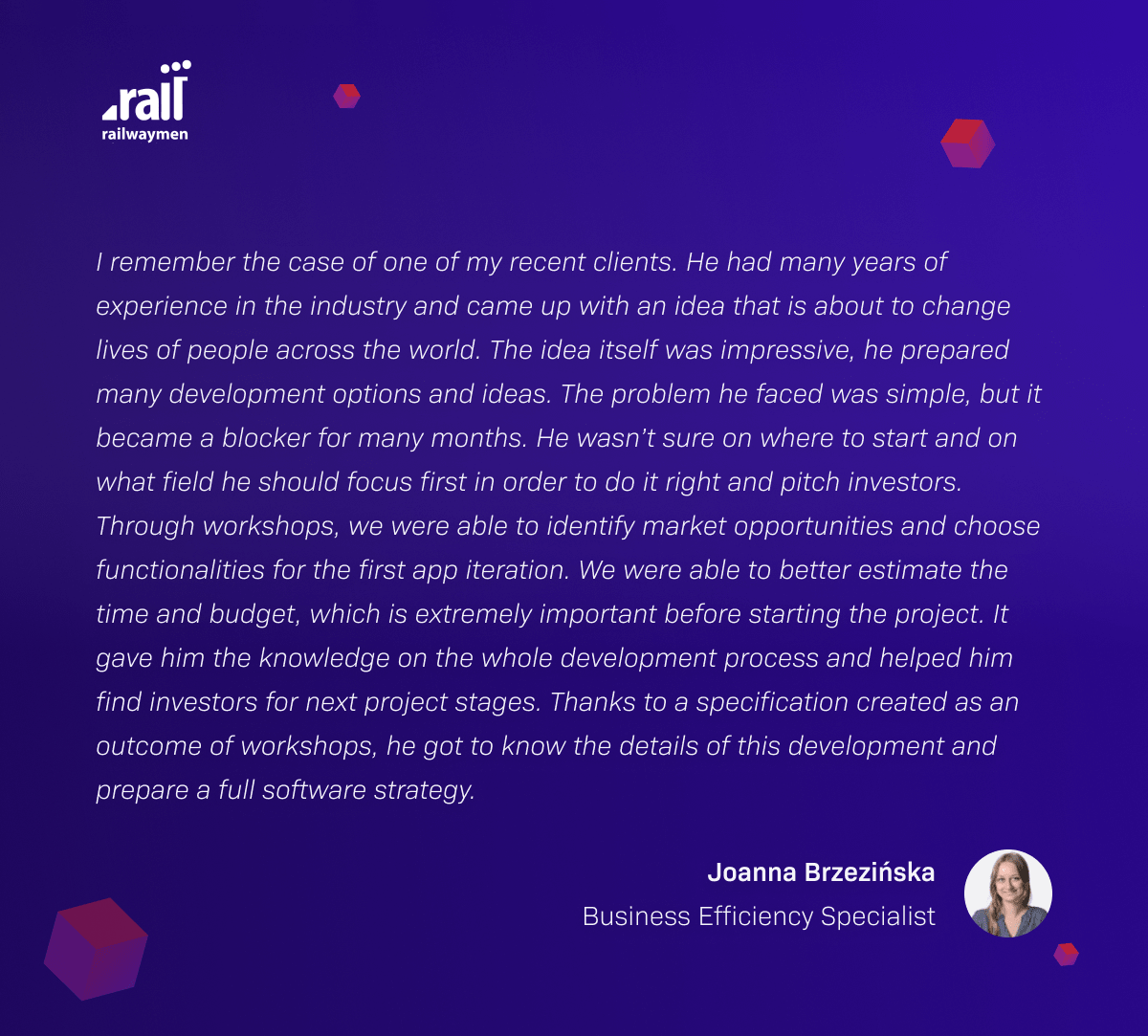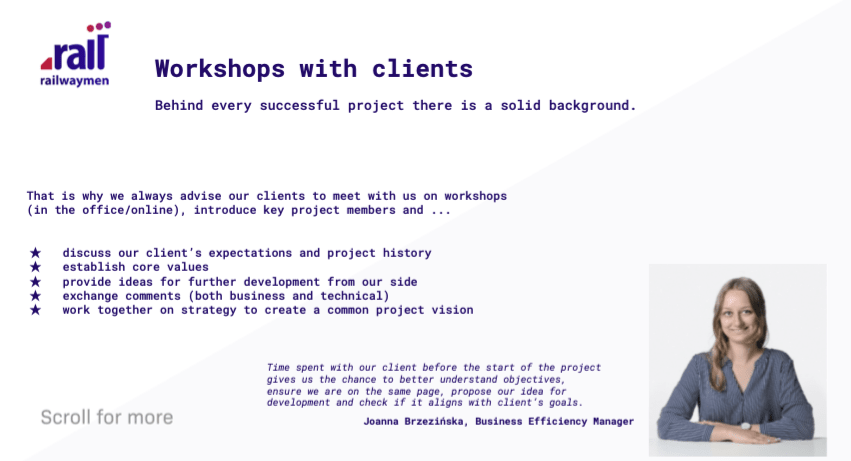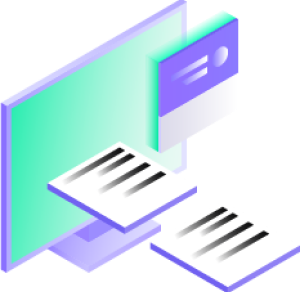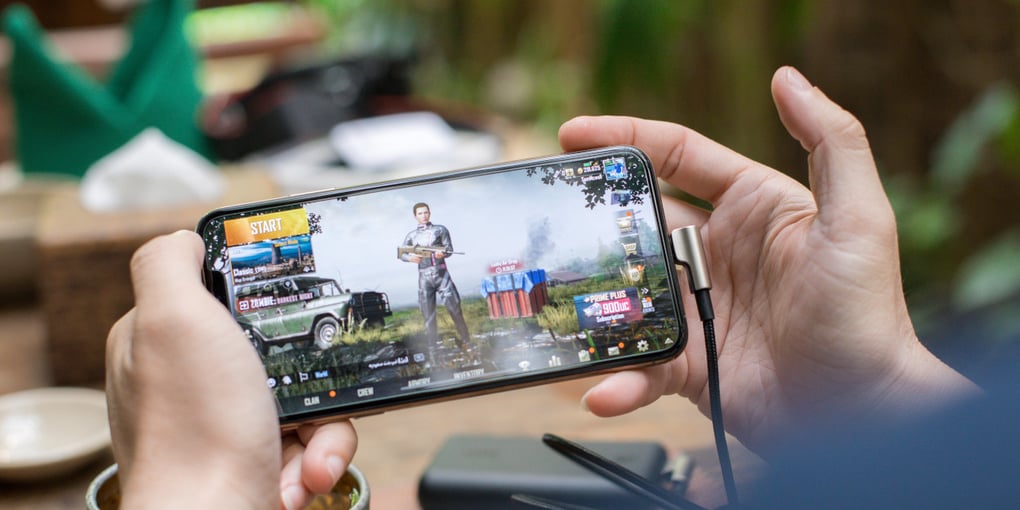While working in software houses and fulfilling the role of Project & Business Development Manager I’ve observed multiple development strategies across various industries: foodtech, healthcare, fintech and many more.

Although every industry and every startup is different, they do have one common goal: to succeed. Success can be defined in various ways, depending on the startup:
- By increasing the number of application users (Shawarmer case)
- By optimizing company’s processes (Cost Tracker case)
- By digitizing the company (Apple Seeds case)
- By fulfilling the mission of helping others (MySoberRoommate case)
- By being one step ahead of competitors (The Perfect Room case)
Industries and markets may vary, business approach and specification may vary, law and regulations differ depending on the market, but every entrepreneur has a vision of a successful development process for their product.
To this day I’ve run software & hardware projects, keeping an eye on the overall development strategy of our clients, monitoring product’s growth and guiding startups and industry leaders through their journey.
Being a mentor in one of Dubai’s accelerators allows me to stay in touch with the latest innovative solutions in the GCC region. My experience gained over the years gave me a wide perspective on software strategies for startups and big players (such as Shawarmer)
Let’s begin from some basics.
Table of Contents:
2. How can you develop a software strategy faster thanks to dedicated Design Thinking workshops?
3. Who will be using your product? Creating a persona.
4. Apart from creating personas, what are other benefits of Design Thinking Workshops?
5. Are in house workshops obligatory?
What is software strategy?
I plan to release my product to market in two months.
A well thought out strategy is the core to success, but how should we define whether it’s good enough? We already did our homework, came up with an idea, created a business plan for upcoming months and we’re searching for partners who will take up the challenge and work on the project. Is it sufficient to succeed?
Yes and no.
Before the actual product development you should specify as many details as possible, among them are:
- How will your application look and function in the real world?
- What are the stages of your project? Which functionalities will be developed in the first and second iteration?
- What should the budget look like at every stage of the project? Do I need some external funds? How will I acquire them for further development?
- Which technologies should be used while creating this product? How should I know whether they are good for this application?
- How to choose an appropriate design team and what to expect from such collaboration? What should I prepare in order to facilitate the estimation process?
The software development process generates a lot of questions. This article will help you successfully start the project:
Checklist - How To Start The App Development Project?
How can you develop a software strategy faster thanks to dedicated Design Thinking workshops?
First workshops I’ve run were about having this absorbing idea but not knowing how to take it to the next level. That is when software workshops come in handy.
Workshops focus on the project's background and problems that the new solution should solve. Such sessions foster teamwork, innovation and most importantly - allow to acquire problem solving skills in action. Thinking outside the box is highly desired, so every member of the team should strongly dive into the idea.
We spend a lot of time designing the bridge, but not enough time thinking about the people who are crossing it.
P. Singh.
Who will be using your product? Creating a persona
During workshops, both teams concentrate on creating a product persona - a fictional user with some specified set of characteristics. It helps us in understanding who and why will be using our solution, so you don’t have to concentrate on dozens of people while thinking about your target audience. Conducting user research at a discovery phase stage is a first step on the path to create adequate customer journeys.
What is usually taken into account while filling a persona template?
- Name
- Age
- Role
- Interests
- Needs
- Frustrations
- Likes & Dislikes

We tend to specify even more details with additional questions:
- Why will this person use our product?
- What will the interaction with a product look like?
- What matters to the user?
- What pain points might the user be experiencing?
- What tasks a user tries to complete?
Apart from creating personas, what are other benefits of Design Thinking Workshops?
I am aware that the idea of workshops may sound complicated and absorbing, but trust me, it brings a lot of meaningful business advantages. Clarification of the persona is just one of them. Let's take a look at other profits:
#1 Meeting the team
Anyone who can contribute to the meeting is invited to join our workshops. We usually gather specialists from various departments (designers, developers, project managers) to make the discussion more and more valuable. Each one of us brings to the table a different point of view and generates different ideas for development. That way, we are sure that the product is discussed as a whole, not only partially.
#2 Revision of current assumptions
Before the session, we do some solid research and analyze the project's documentation, so that we can focus on important aspects and not leave anything behind.
#3 Identifying risks and challenges
Since our developers and designers already have knowledge gained while working on many different projects, identifying possible risks and challenges comes with ease. Not only we identify them, but we search for solutions and ways of dealing with them. This way we’re convinced that we have everything covered before the actual development.
#4 Discussing project’s history
Knowing what motivates the client and getting to know all the details of how the solution was born, helps us in establishing where we are heading and grasping the whole idea.
#5 Identifying competitors and their solutions
Another key point. While doing our research before workshops we analyze similar solutions with a strong focus on functionalities. Then we discuss them with our client and search for aspects that will differentiate our product among others, making it more attractive for users.
#6 Generating new ideas
Brainstorming is our favourite part. The more people, the more ideas. This is where the fun begins and ends with creative outcomes.
#7 Creating an initial scope of work
Every workshop session should end with a good physical outcome. We make a draft of a possible scope for companies that don’t have a clear vision yet and wait for our client’s feedback.
#8 Being able to prepare an estimation after workshops
As during workshops we cover many aspects of the project by discussing them, we are able to estimate the project’s budget more clearly. It empowers our clients to adjust the initial budget, search for further funding and simply know everything in detail.
Are in house workshops obligatory?
In-house workshops are a nice opportunity to meet in person and work on the solution hand-in-hand over a cup of coffee. Each session is set individually so the agenda is personalized and adjusted to a particular project and participants. There are no exactly the same sessions.
Of course as most of our clients are from various parts of the world - we also conduct such meetings online (and the atmosphere is as great as in the office:)). Thanks to tools designed for remote workshops, our meetings are still fun and productive. We turn our cameras on and have a vivid brainstorming session as usual :)
To bounce ideas about your project with us:

Workshops are run by Railwaymen’s Business Efficiency Experts who get in touch with you. After evaluating the solution and project’s insights, they schedule a workshop session and provide you with all the details :)
How should I prepare for workshops?
Having an initial project documentation is helpful for the team, but don’t worry if you have a great idea but no written specification, as the team will help you create it from scratch if needed.
We do require a hands-on approach and a free 3-hrs slot, that’s all! :)
Who should join the meeting from my team?
Basically everyone who would like to contribute and have an impact on the project. Usually we advise CEO’s to be present together with key members of their team, who will decide in the future about various project's aspects. We would like to know their thoughts and work together on common solutions.
Subscribe to our newsletter and gain knowledge about app development straight to your inbox:

Now we want to share it with you!
What happens after the Design Thinking Workshops?
We know each other well enough to move forward. Our team sends you the outcome of workshops (the outcome is being discussed before workshops and depends on your needs - it can be a general app flow, a specification, initial mockups etc.). On this basis we can prepare a budget and time estimation that will allow you to make the next step. Usually our clients choose to go with the Development Phase or start the project with creating first wireframes to visualize it better. Either way, we are here to advise you on what to do next.
Conclusion
Workshops are an amazing way to not only understand the product, but to understand everyone’s perspective. Moreover, they are also our meeting place, where we can all make sure we are a good match in this exciting development journey. There are things that can be noticed faster if we discuss it together, identify all the assumptions and simply build a foundation for the project that will succeed in the future.
Feel free to ask me any questions about the Design Thinking Workshops or App Development Process. You can catch me through my LinkedIn profile, or email.
. I am sure that together we will build an amazing app!







